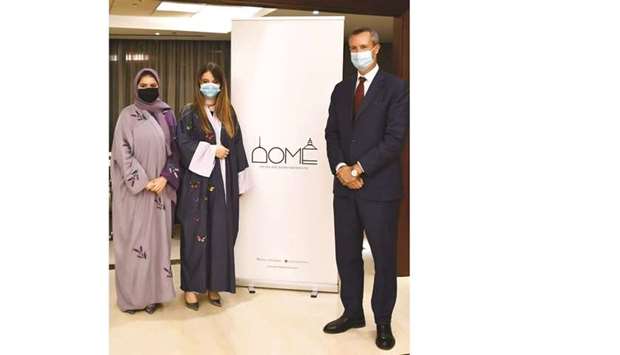When the coronavirus (Covid-19) pandemic took over the world and ground everything in the country and the world to a halt, two Doha-based teenaged entrepreneurs started their own fashion project — born of a need to do something constructive during the lockdown.
What followed was the introduction of a collection of abayas specially made for teens in the region.
With penchant for ethical fashion, the Qatari-Italian duo, 18-year-old Fatima al-Ansari from Doha and 16-year-old Aimee Jade (AJ) Monti from Rome, aptly called their fashion project the “DOME” Fashionistas, intermingling the craft and design sensibility unique to the places they come from.
In an endeavour to help build an Italy-Qatar bridge, the Qatari Business Women Association (QBWA) and the Italian Chamber of Commerce (ICC) have partnered in supporting the project.
The result of this collaboration, DOME’s first collection “Dream Big 2021”, is dedicated to a niche of young teenage girls looking to add more colour, patterns and everything quirky to the otherwise standard black abaya.
Speaking recently at a press conference and introducing the young entrepreneurs, Alessandro Prunas, Italy’s ambassador to Qatar, said: “We are pleased to encourage fashion projects between Qatari designers and Italian SMEs (small- and medium-sized enterprises) which can supply the craftmanship and the finest materials, from clothes to shoes to jewellery and accessories.”
“This particular project involved three companies from the region of Abruzzo and Marche, where craftsmanship still plays a big role and artisans are the backbone of the economy,” the ambassador said. “From the refined jacquard silks and the innovative denim fabrics to the rhinestones used for the decorations on Aimee’s abayas, the materials are all made in Italy.”
“Italian fashion designer Eliana Casaula was a mentor to our young designers via Zoom, and supported them to develop the ‘Dream Big’ Collection. I hope this initial co-operation will lead to a bigger exchange between Qatar and Abruzzo and Marche,” Prunas added.
During the event, both al-Ansari and Monti, who were wearing their own designs, spoke about their dreams to pursue careers in the fashion industry.
They visited local abaya productions and analysed various abaya companies to develop a trendy product suitable for the local culture.
Much effort had to be made to maintain quality whilst taking inspiration from butterflies, mermaids, Japanese flowers, and social media emojis, and incorporating them on the abayas in form of ironed-on patches, sourced and shipped internationally.
The logistics of local tailoring, mesh of fabric from Italy and Qatar back and forth, also took time.
It was a tedious project – but certainly worthwhile from the social and commercial perspective.
The capsule collection featuring six abayas, with more available on made-to-order, serve as an apt homage to traditional cuts but standing out for its originality.

Italian ambassador Prunas with teen entrepreneurs Aimee Jade (AJ) Monti and Fatima al-Ansari.
